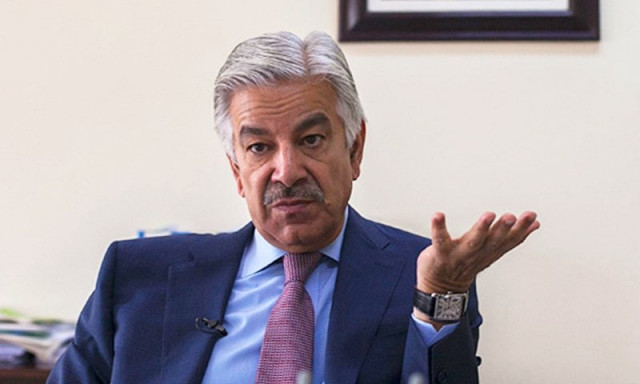Let’s fake it
As journalism evolves, one has to worry about the trend of fake news

Defence Minister Khawaja Asif. PHOTO: REUTERS
Not one to stay quiet, Asif took to Twitter in a scathing post directed at Israel: “Israeli def min threatens nuclear retaliation presuming pak role in Syria against Daesh,” adding “Israel forgets Pakistan is a Nuclear state too.” The only problem is that the original story was fake. Khawaja Asif should have checked.
Here’s some advice to our defence minister from media analysts. If the first you’ve heard of a particular event is from a website you’ve never heard of, there may be a reason. Be skeptical of stories about Trump, Clinton, the Pope, Kim Kardashian and Justin Bieber, and particularly of stories about any of them pledging allegiance to ISIS. In most probability, they will be fake.
Fake news may be funny for most Pakistanis, but all over the world this has become a source of concern. In fact, some are saying that it was this trend that helped President Trump win the elections.
In its purest form, fake news is completely made up, manipulated to resemble credible journalism and attract maximum attention and, with it, advertising revenue. Examples include: “Pope Francis at White House: ‘Holy Quran and Holy Bible are the same.” This news was extensively carried on Pakistani websites.
A report in the Guardian newspaper says that fake news is hosted on websites that often followed design conventions of online news media.
In the case of the Khawaja Asif retort, the fake story, titled “Israeli Defense Minister: If Pakistan send ground troops to Syria on any pretext, we will destroy this country with a nuclear attack,” published on awdnews.com, even got the Israeli defence minister’s name wrong.
The typo-laden headline published on December 20 was not the first time a fake news article was posted on the website. Earlier, the website had published an article with the headline, “Clinton is staging a military coup against Trump.” Therefore the problem starts when genuine websites pick up news without verifying and run it. All Khawaja Asif had to do was verify his source.
But our defence minister is not the only victim. The fake news phenomenon has sent major internet companies scrambling to respond amidst claims that bogus reports that proliferated ahead of the US presidential election may have skewed the result.
The most famous example of a fake news story that has had real-world consequences comes from the US. On 4 December, a North Carolina man opened fire at the Washington pizzeria Comet Ping Pong, which an online conspiracy theory showed to be the headquarters of a child sex ring run by Hillary Clinton.
It’s when opinion leaders repeat the fake story that it takes on a life of its own. That Democratic senators wanted to impose Sharia in Florida was repeated by Michael Flynn, Trump’s nominee for national security adviser made it into news.
What is particularly worrisome for Americans and the world is that an analysis by BuzzFeed found that fake news stories drew more shares and engagement during the final three months of the campaign than reports from (for example) the New York Times, the Washington Post and CNN. This has become a sore point for many Americans.
But there is money to be made in this so consequences be damned. A man running a string of fake news sites from Los Angeles told the media that he made as much as US$30,000 a month from advertising that rewards high traffic. And this trend is not restricted to the US. What is incredulous is that more than 100 pro-Trump fake news websites were being run by teenagers in one town in Macedonia.
We are told that soon Facebook will flag stories of questionable legitimacy with an alert that says “Disputed by 3rd party fact-checkers”. There are three Google Chrome plugins and one just released by Slate that do similar as you browse the web.
As journalism evolves, one has to worry about the trend of fake news. The whole culture of running news without verification has to be questioned. Similarly, posting news that will garner traffic irrespective of what source it comes from has made many question the motives of the media.
Published in The Express Tribune, December 26th, 2016.
Like Opinion & Editorial on Facebook, follow @ETOpEd on Twitter to receive all updates on all our daily pieces.















COMMENTS
Comments are moderated and generally will be posted if they are on-topic and not abusive.
For more information, please see our Comments FAQ